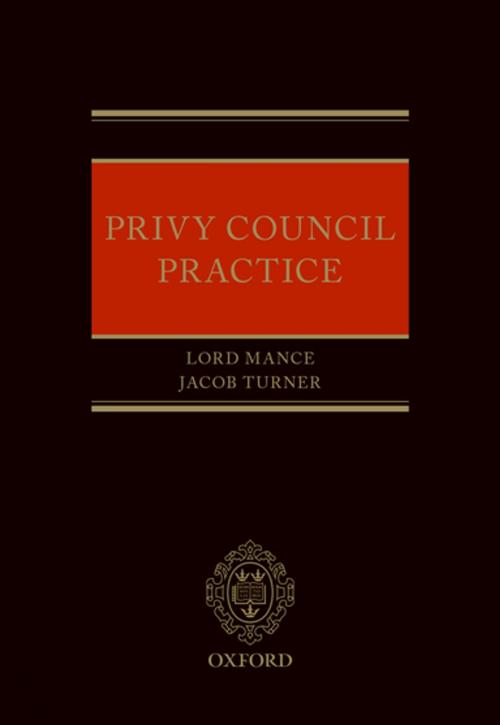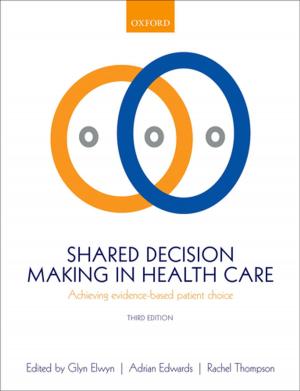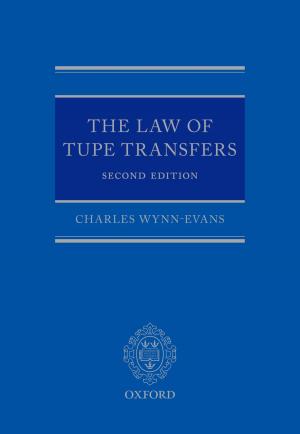| Author: | Jacob Turner, Lord Mance | ISBN: | 9780192519481 |
| Publisher: | OUP Oxford | Publication: | October 26, 2017 |
| Imprint: | OUP Oxford | Language: | English |
| Author: | Jacob Turner, Lord Mance |
| ISBN: | 9780192519481 |
| Publisher: | OUP Oxford |
| Publication: | October 26, 2017 |
| Imprint: | OUP Oxford |
| Language: | English |
The Judicial Committee of the Privy Council (JCPC) is the court of final appeal for jurisdictions including the British Overseas Territories and Crown Dependencies, and for those Commonwealth countries that have retained the appeal to Her Majesty in Council. This volume aims to explain the JCPC's unique procedures, practices, and, where relevant, jurisprudence in a manner which is readily accessible, even to those unfamiliar with it. It will provide valuable guidance to practitioners considering whether to seek recourse to the JCPC and, if an appeal is pursued, throughout the appeal process. This comprehensive guide to the JCPC is the first work of its kind since 1937. It includes chapters on jurisdiction, conditions of appeal, precedent, and the JCPC's role in interpreting constitutions as part of a workload which still ranges from death row criminal cases to heavy commercial disputes. Importantly, the authors provide detailed commentary on the complex Rules and Practice Directions that underwent a significant overhaul in 2009, for which no dedicated volume currently exists. Emphasis is placed on topics of greatest practical importance to litigants, including timings, the form and content of written cases, issues of costs, and the role of the Registrar. This one-stop reference is essential for any practitioner in the countries for which the JCPC remains the final court of appeal, as well as for UK solicitors acting as local counsel and members of the UK Bar instructed in JCPC appeals. It also provides students and academics with chapters on the history, jurisprudence, and the sources of law considered by the JCPC, as well as on its interaction with other court systems. The release of this work is particularly timely given that in the judgment Willers v Gubayi [2016] UKSC 44 the UK Supreme Court explained for the first time the circumstances in which the JCPC may bind the Courts of England and Wales. With authoritative authorship and unique content, this is a must-have resource for all those pursuing a case before, or with an interest in, the JCPC.
The Judicial Committee of the Privy Council (JCPC) is the court of final appeal for jurisdictions including the British Overseas Territories and Crown Dependencies, and for those Commonwealth countries that have retained the appeal to Her Majesty in Council. This volume aims to explain the JCPC's unique procedures, practices, and, where relevant, jurisprudence in a manner which is readily accessible, even to those unfamiliar with it. It will provide valuable guidance to practitioners considering whether to seek recourse to the JCPC and, if an appeal is pursued, throughout the appeal process. This comprehensive guide to the JCPC is the first work of its kind since 1937. It includes chapters on jurisdiction, conditions of appeal, precedent, and the JCPC's role in interpreting constitutions as part of a workload which still ranges from death row criminal cases to heavy commercial disputes. Importantly, the authors provide detailed commentary on the complex Rules and Practice Directions that underwent a significant overhaul in 2009, for which no dedicated volume currently exists. Emphasis is placed on topics of greatest practical importance to litigants, including timings, the form and content of written cases, issues of costs, and the role of the Registrar. This one-stop reference is essential for any practitioner in the countries for which the JCPC remains the final court of appeal, as well as for UK solicitors acting as local counsel and members of the UK Bar instructed in JCPC appeals. It also provides students and academics with chapters on the history, jurisprudence, and the sources of law considered by the JCPC, as well as on its interaction with other court systems. The release of this work is particularly timely given that in the judgment Willers v Gubayi [2016] UKSC 44 the UK Supreme Court explained for the first time the circumstances in which the JCPC may bind the Courts of England and Wales. With authoritative authorship and unique content, this is a must-have resource for all those pursuing a case before, or with an interest in, the JCPC.















